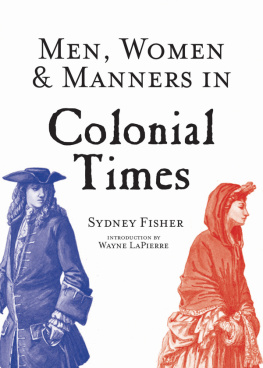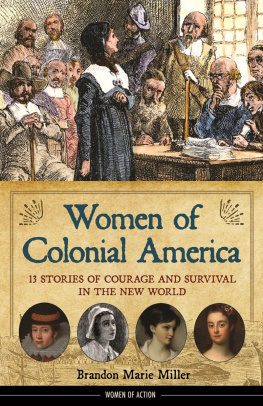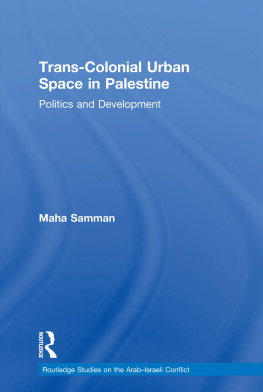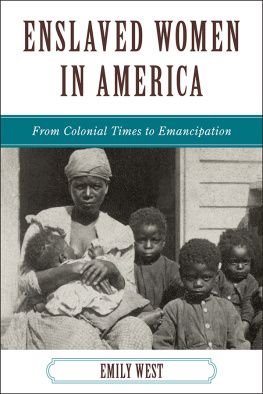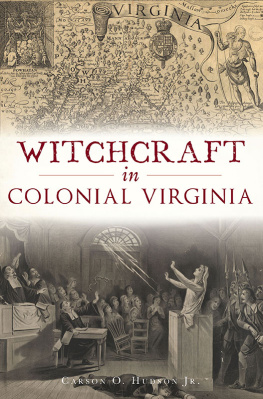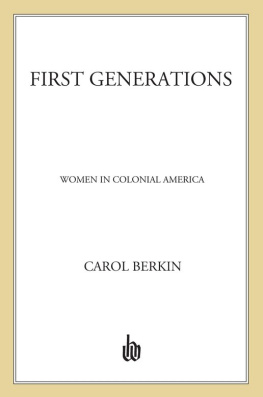Women, Family, and Community in Colonial America: Two Perspectives
The Women & History series:
Beautiful Merchandise: Prostitution in China 1860 -1936, by Sue Gronewold
The Empire of the Mother: American Writing about Domesticity 1830 - 1860, by Mary P. Ryan
Women, Family, and Community in Colonial America:
Two Perspectives, by Alison Duncan Hirsch and Linda Speth, with an Introduction by Carol Berkin
Forthcoming:
Votes and More for Women: Suffrage and After in Connecticut, by Carole Nichols, with an Introduction by Lois Banner
A New Song: Celibate Women in the First Three Christian Centuries, by JoAnn McNamara
Dames Employees: The Feminization of Postal Work in Nineteenth-Century France, by Susan Bachrach
Women in the Enlightenment, by Margaret Hunt, Margaret Jacob, Phyllis Mack, and Ruth Perry, with a Foreword by Ruth Graham
First published by
The Haworth Press, Inc.
10 Alice Street
Binghamton, N Y 13904-1580
This edition published 2011 by Routledge
| Routledge | Routledge |
| Taylor & Francis Group | Taylor & Francis Group |
| 711 Third Avenue | 2 Park Square, Milton Park |
| New York, NY 10017 | Abingdon, Oxon OX14 4RN |
Women, Family, and Community in Colonial America: Two Perspectives has also been published as Women & History, Number 4, Winter 1982.
Copyright 1983 by The Haworth Press, Inc. All rights reserved. Copies of articles in this work may be reproduced noncommercially for the purpose of educational or scientific advancement. Otherwise, no part of this work may be reproduced or utilized in any form or by any means, electronic or mechanical, including photocopying. microfilm, and recording, or by any information storage and retrieval system, without permission in writing from the publisher.
The Haworth Press, Inc., 12 West 32 Street, New York, NY 10001 EUROSPAN/Haworth, 3 Henrietta Street, WC2E 8LU England
Library of Congress Cataloging in Publication Data
Speth, Linda.
Women, family, and community in colonial America.
(Women & history ; no. 4)
Includes bibliographical references.
I. Married womenVirginiaHistory. 2. WillsVirginiaHistory. 3. DowerVirginiaHistory. 4. Trials (Divorce)ConnecticutHistory.
I. Hirsch. Alison Duncan. II. Title. III. Series.
KF521.S63 1983 346.730134 82-23326
ISBN 0-86656-191-9 347.306134
EDITOR: ELEANOR S. RIEMER
ASSOCIATE EDITOR: ALICE MILLER
CONTRIBUTING EDITOR: CAROL BERKIN
BOARD OF ADVISORS
PHYLLIS ANDORS, Wagner College
LOIS BANNER, George Washington University
REN ATE BRIDENTHAL, Brooklyn College, City University of New York*
SANDI COOPER, College of Staten nsland, City University of New York*
LEONORE DAVIDOFF, University of Essex, England
ELIZABETH FOX-GENOVESE, State University of New York Binghamton
BARBARA HARRIS, Pace Universityy
DOROTHY HELLY, Hunter College, City University of New York*
BARBARA S. KANNER, Occidental College
ALICE KESSLER-HARRIS, Hofstra University
GERDA LERNER, University of Wisconsin
KATHLEEN McCRONE, University of Windsor, Cana
JOANN McNAMARA, Hunter College, City University of New York*
MARY BETH NORTON, Cornell University
SARAH POMEROY, Hunter College, City University of New York*
ANNE FIROR SCOTT, Duke University
JOAN SCOTT, Brown University
CARROLL SMITH-ROSENBERG, University of Pennsylvania
ROSALYN TERBORG-PENN, Morgan State University
MARGIA WRIGHT, Columbia University*
*A Fellow of the Institute for Research in History
INTRODUCTION
Historians of colonial women have found legal sources and documents to be a mixed blessing: while commanding and demanding our attention, these records have not yielded up their secrets as easily as we might have wished. Lacking a Rosetta Stone, scholars have had to rely on a trial and error method. Nonetheless, legal sources promise to tell us more about women's status and role in colonial society than any other historical source.
We already know that the law itself is not descriptive of reality but proscriptive. Laws show what a society wishes to be, what it aspires toor at least what those in power aspire to for themselves and for others. While reconstructing the legal paradigms is essential, it has proven disastrous to confuse them with reality, especially in the case of colonial women. Despite their legally circumscribed and subordinate status, women were not as helpless to shape their lives as they appeared to be in the law.
In addition, the discovery and explication of colonial women's legal status has been complicated by the existence of different patterns in each colony. Thus legal historians, have had to constantly revise, correct, or qualify their descriptions of the legal status of women as they moved from Quaker records in Pennsylvania, to Puritan-inspired records in Massachusetts, or to Virginia and New York laws. This task of reconstruction has been so tortuous and has required such painstaking scholarship that we are naturally loathe to dismiss our accomplishment as no more than a starting point.
Clearly, however, historians such as Marylynn Salmon, Lois Carr and Lorena Walsh, and Gwen Gampel have gone beyond these early stages of legal excavation and labeling. They, like the two young historians in this volume, have sought to discover social realities rather than proscriptions; to measure and analyze the gap between the ideal and the real; to explore the impact of law on women's lives, and conversely, the impact of women's lives on the development of the law; to trace the connections between economic exigency and legal innovation; to exploit the legal records so that they yield up new information and insight into the daily experiences of colonial women; and finally, to effectively join issues of women's legal status to other significant issues in women's history.
The two essays in this volume go far in advancing our understanding of colonial women, as well as illustrating how to use legal sources effectively. They reflect the diversity of approach to legal sources and show us how to enhance the value of this kind of documentation by intelligently combining it with material on demography, economic organization of colonial society, and the structure of the colonial family.
In More Than Her Thirds: Wives and Widows in Colonial Virginia, Linda Speth analyzes a collection of 394 wills from three Virginia counties in order to discover general patterns of behavior among rural women and men regarding property. Throughout her essay, she has four central questions in mind: first, to what degree did Virginia husbands and fathers conform to legal tradition regarding inheritance patterns, and in what significant ways did their practice diverge? Second, what do their wills tell us about how women were regarded and treated by men? Third, to what degree did women actually acquire and control property, and under what set of circumstances? Finally, what patterns of behavior emerged among women who, as widows, acquired and controlled property?



